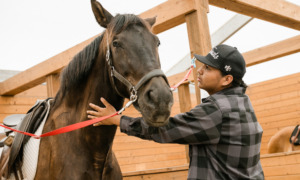***Yesterday, YouthToday.org published a piece from Spalding University (Ky.) social work professor Helen Deines about the life and career of her friend, legendary youth advocate David Richart, who passed away this week at the age of 63. Richart had been diagnosed recently with pancreatic cancer.
Richart founded Kentucky Youth Advocates in 1975, and co-authored “Fairness Is a Kid’s Game” with Stephen Bing in 1989, a book that is still considered a seminal resource in child advocacy.
Among Richart’s many titles was board member for Youth Today. We have been lucky to have some of the best minds in philanthropy and youth work on our board over the years, but Richart stands out to us as the one who most used the publication as a resource. He was always quick to send an e-mail commending reporters for a good story, and it was never lost on any of us that a major leader in advocacy was eagerly awaiting the next issue of Youth Today.
Here are some comments from youth work leaders who knew him.
Mark Soler, executive director of the Center for Children’s Law and Policy:
“David was decades ahead in thinking about advocacy strategies, and was the first to use a combination of legislation, litigation, media and advocacy to … press for reforms to help children.
“He was best kind of advocate: Alert to situations where children were mistreated, and always looking for better ways of doing things. He was a mentor to me early on, and he will be dearly missed.”
Bill Treanor, founder and former publisher of Youth Today:
“David ran one of the very best advocacy efforts in the country, and really was one of the first to come up with the idea [of youth advocacy]. He never got the kind of national accolades he deserved.”
Jack Levine, founder of the 4 Generations Institute in Florida, who wrote this in an editorial published by the Louisville Courier-Journal:
“He was among the small handful of us in the late 1970s that envisioned a national movement of organized state and community-based child advocates, and served on the first board of directors of what would become Voices for America’s Children (www.voices.org).
“David’s generosity of spirit and wisdom in strategic thinking was well-known. He was a natural and nurturing advocate. His mission in life was to wake us up to the needs of children and lead us to actions we could, should and will take to address those needs. David led by example, and he intended us to follow.”
Liz Ryan, executive director of the Campaign for Youth Justice:
“He pioneered a lot of child advocacy strategies and worked on issues that are still pressing today. It was really a privilege to get to learn from him, particularly about his experience starting a child advocacy organization.”
***Day number 851 of the Obama administration with no nominee to serve as administrator of the Office of Juvenile Justice and Delinquency Prevention. As we mentioned last week and reported here this week, a group of 19 congressmen wrote the president and vice president, imploring them to name someone for the position.
The word is still that Jane Tewksbury is the candidate that the Justice Department has settled on, and it is really up to the White House to make a call on her at this point. She has been in the mix for this job for at least six months.
***Meanwhile, a slew of state juvenile justice leaders are converging on Washington this week and next for meetings on the hill and at OJJDP, as well as the annual spring conference of the Coalition for Juvenile Justice. JJ Today’s intel is that there will likely be some frustration vented at OJJDP over two items in particular:
2011 Funding: States were initially told that there would be a 17 percent cut across the board to the federal dollars flowing into states from OJJDP. But the majority of states receive a minimum allocation, and a 17 percent cut to funds for those states would have put them below that funding floor.
To address this, OJJDP reduced funds for larger states by more than 17 percent; one state’s cut was more like 29 percent. Many state leaders had already reported to their bosses about what the federal money would be, and then had to go back and report a significantly lower number.
Changes in compliance monitoring on the Juvenile Justice and Delinquency Prevention Act requirements: particularly, how OJJDP factors certain alcohol-related charges for older teens in states where the age of jurisdiction is below 18. In those states, because 16- or 17-year-olds are considered adults by law, they can be jailed in connection with charges of possessing alcohol; generally referred to as minor in possession (MIP) charges.
In a state where such teens are considered juveniles, the charge would be a status offense and it would violate the core requirement of the JJPDA that prohibits detention of status offenders (DSO).
In the past, one state specialist told JJ Today, OJJDP did not count the MIP cases that ended up in adult jail against a state when it came to monitoring. Now, the specialist said, those cases are factored in when determining if a state has violated the DSO requirement, and it already might have cost North Carolina money. The state was found out of compliance on DSO in 2009.
***Here’s some good news on compliance though: Mississippi is in compliance with all four core requirements. It’s the first time since 2005.
***The Center for Juvenile Justice Reform at Georgetown University issued a report this week with the kind of lengthy title that only a research geek could love: Safety, Fairness, Stability: Repositioning Juvenile Justice and Child Welfare to Engage Families and Communities. Rolls right off the tongue!
The paper was funded by two federal agencies (OJJDP and the Substance Abuse and Mental Health Services Administration) and makes the case that conferencing should be relied upon more often in handling youth involved in both the child welfare and juvenile justice systems. It starts with discussions of family involvement in the system, and then defines family engagement and conferencing strategies before moving to an explanation of how they are implemented effectively.
CJJR Director Shay Bilchik captures the gist in his introduction:
“We need to disabuse ourselves of the notion that we can or should separate these youths from their families. Whether it be a youth receiving services while remaining in the home, reentering the community from placement in the juvenile justice system, reuniting with family members after being removed from their care and custody due to abuse or neglect, or aging out of foster care or the juvenile justice system (or both), we need to work with our young people as they reengage with their families, helping them to navigate those families in a healthy way.”
***Congratulations to the winners of this year’s Soros Justice Fellowships, which are given out annually by the Open Society Foundation. Open Society will fund 18 fellows for a total of $1.6 million this year to explore a range of criminal justice reform issues.
Seven of the fellows will focus on juvenile justice issues, and Open Society’s Maria Archuleta provided us with some details on those projects. From Archuleta:
Tarsha Jackson will spearhead an effort to ensure that directly affected youth and their families play a meaningful role in the efforts to reform policies around youth confinement in the Harris County, Texas, jail system.
Sonia Kumar will challenge policies and practices that contribute to the needless detention of girls in Maryland’s juvenile justice system, and will work to ensure that statewide systems reform include girls’ perspectives, needs and voices.
Through public education and advocacy, Nicole Pittman, will raise awareness around the practicality, constitutionality and wisdom of including children in our country’s sex offense registration and notification systems.
Benay Rubenstein will mobilize educators, advocates, researchers and students to reform the State University of New York’s admissions policies that impose significant barriers to higher education for people with criminal records.
Through a series of print and multimedia pieces, journalist Chandra Thomas will examine the ways that some Georgia schools divert at-risk children into the state’s 200-plus alternative schools, priming them for the criminal justice system.
Wesley Ware will work with gay youth in New Orleans in a grassroots effort to reform practices regarding the policing arrest, and incarceration of gay youth in Louisiana.
Sara Zier will seek to deter the incarceration of youth with mental illnesses in Washington State by facilitating their access to much needed community-based mental healthcare services.
We certainly hope to meet all of the fellows and hear how the projects go. Journalist Chandra Thomas has done some great reporting this year for the Juvenile Justice Information Exchange, and policy analyst Nicole Pittman has really been the most persistent force pushing states to approach compliance with the Adam Walsh Act’s sex offender registry requirements thoughtfully (sadly, we hear, without nearly enough success…more on that next week).
***Last week, we mentioned that a group called the Criminal Justice Funders Network issued a report called “Transcending Boundaries: Strengthening Impact,” which mostly consists of findings from two surveys: one of foundations that fund criminal- and juvenile justice-related projects, and another of justice organizations that receive funds from foundations.
After sifting through the findings, these themes that jumped out at JJ Today:
-Funders focus on the beginning and end of the system. About 30 percent of foundations report that crime prevention or diversion from the system are their primary area of giving, and 22 percent report a focus on offender reentry. In contrast, 8 percent focused on sentencing, 2 percent on probation or parole, and 3 percent focused on conditions of confinement.
-Very few justice funders have a myopic focus on juvenile justice. About three quarters of the foundations reported funding both juvenile and adult work, only 12 percent reported doing juvenile justice only.
-The vast majority of the grantees of these foundations do not get money from the government or from corporate sources. The report also states that 45 percent of groups report no money from income-generating ventures, but to us that doesn’t seem so bad. More than half of the organizations operate some sort of service that generates revenue? Seems pretty good.
-Both parties, funders and grantees, share an “interest in increased collaboration to address justice-related issues.” Among the top areas where collaboration was specifically desired: justice reinvestment, or the practice of pushing systems to use savings from reform to fund the strategies that can make a reform successful. In a fiscal era in which the pressure is on to put every saved dollar toward deficits, that is a tough nut to crack.
























